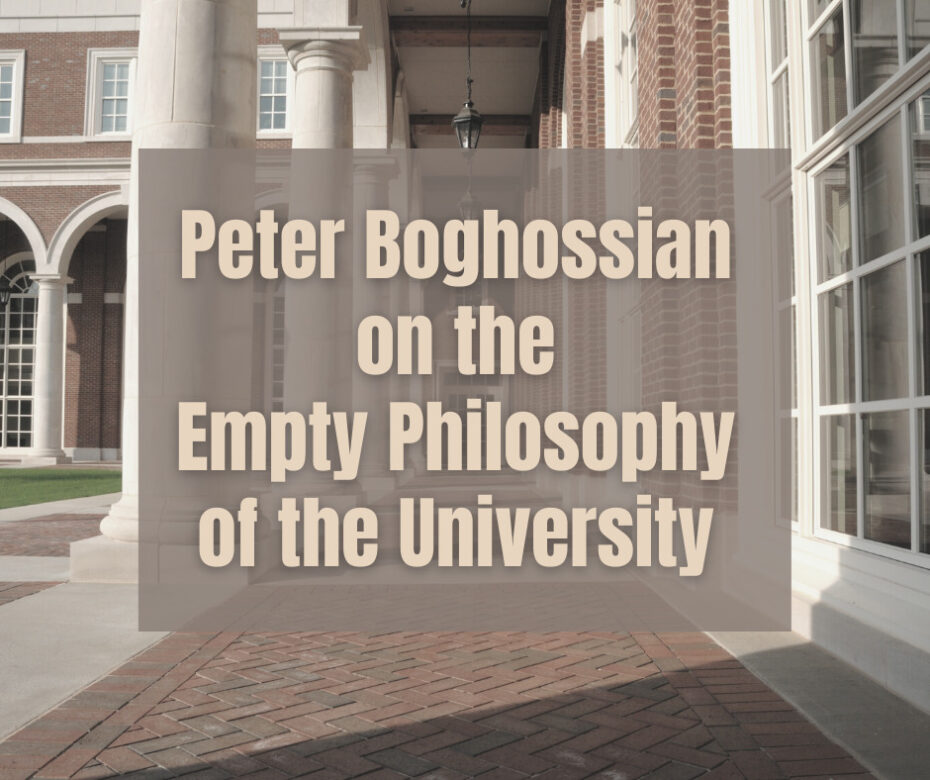Many of my friends are sending their kids off to college and university. For the most part, those students are leaving unprepared.
I don’t mean they’re unprepared to continue studying subjects like business, biology, history, or physics. I mean, they’re unprepared for the worldview challenges to come.
In general, churches do not intellectually prepare parishioners for much of anything. I don’t blame the churches for that since it would be hard with only one hour of instruction per week to equip any student. People need daily instruction, and it is up to them to get it, not the local church. Individuals and families must take personal responsibility for their intellectual growth, especially the growth of their children (which is why I wrote a catechism for my family). Tragically, most Christians choose to get their daily instruction from Hollywood and the secular news. Consequently, Christian students head off to college and university unprepared.
One of my intellectual heroes is Abraham Kuyper, a pastor, theologian, newspaper editor, and politician. I went to study at the school he founded, the Free University of Amsterdam. Although I disagree with Kuyper on several theological issues (he was Reformed), I agree with his emphasis on developing a worldview. The Free University was meant to teach academic subjects from a Christian perspective. Why? Because all thought has presuppositions. Thinking is never “neutral.” If you don’t have Christian assumptions, you’ll have non-Christian ones. (I highly recommend this book for thinking about worldviews.)
So Christian college and university students will be facing numerous worldview challenges. Of course, now it is their responsibility to research the questions, find the answers, defend the truth, and expose the flaws of secular worldviews. (I wrote about testing worldviews in this book.)
I thought of those issues after reading this letter by Peter Boghossian, a secular philosopher who recently quit teaching at Portland State University. In his judgment, it was no longer a place for intellectual inquiry:
…brick by brick, the university has made this kind of intellectual exploration impossible. It has transformed a bastion of free inquiry into a Social Justice factory whose only inputs were race, gender, and victimhood and whose only outputs were grievance and division.
Instead of being taught to think, students were trained to be afraid to think:
Students at Portland State are not being taught to think. Rather, they are being trained to mimic the moral certainty of ideologues. Faculty and administrators have abdicated the university’s truth-seeking mission and instead drive intolerance of divergent beliefs and opinions. This has created a culture of offense where students are now afraid to speak openly and honestly.
Read the whole letter, especially if you have kids in college. It’s an insightful glimpse into the intellectual climate of many universities (also, check out this free speech ranking of colleges).
The truth is, you can never shield your children from encountering conflicting worldviews. Even sending them to a Christian college or university can’t insulate them away from the culture at large. And I would argue, you shouldn’t try. What your students need—what all Christians need—is to be intellectually equipped to critically engage with other worldviews (which is why I went to Amsterdam). Paul warned against being cheated by philosophy—
Beware lest anyone cheat you through philosophy and empty deceit, according to the tradition of men, according to the basic principles of the world, and not according to Christ (Col 2:8).
But Paul also said it’s not enough to be wary of hostile philosophies—we need to actively refute them, just like we’d refute the claims of the cults and of other religions:
casting down arguments and every high thing that exalts itself against the knowledge of God, bringing every thought into captivity to the obedience of Christ (2 Cor 10:5).
Boghossian explains that he tried to do that very thing, i.e., expose the corruption of current thinking at the university:
There was an urgent need to demonstrate that morally fashionable papers— no matter how absurd—could be published. I believed then that if I exposed the theoretical flaws of this body of literature, I could help the university community avoid building edifices on such shaky ground.
Boghossian was wrong. He did not convince his colleagues. Instead, they retaliated. And eventually, he quit.
Boghossian was at a disadvantage, I think, because his anti-Christian atheist worldview is no more true to reality than the worldviews he criticized. In that sense, Christians are in a different position. We have a rich intellectual heritage to draw upon, and there has been a renaissance of Christian worldview thinking across the disciplines. There are intellectual resources to answer the challenges of secularism, cultural Marxism, and critical race theory (to name only a few).
The first step is educating yourself. Before you can cast down arguments, you have to know what the arguments are, and Boghossian’s letter gives you a glimpse of what Christians in academia face.


